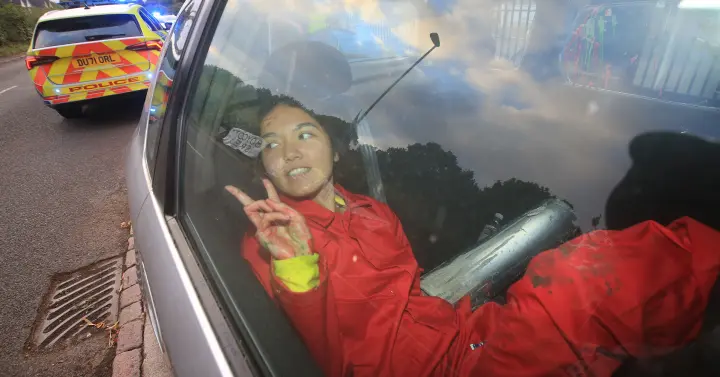A judge has acquitted two Palestine Action activists after they blockade the entrance to a drone engine-making factory that supplies Elbit Systems, Israel’s largest privately owned arms company. Crucially, the judge let them off using a precedent of proportionately versus what they were protesting – that is, the pair’s actions were reasonable compared to what the drones would have done in the Occupied Territories.
Palestine Action: blockading Elbit subsidiary UAV Engines
Back in September 2022, Jasmine and Iola were protesting at UAV Engines Ltd, which is owned by Elbit Systems. This was part of an ongoing activist camp at the site in Shenstone. UAV specialises in making engines for combat drones. Palestine Action said in a press release that:
Elbit openly market these as ‘battle-tested’ on the Palestinian population. The Hermes 450 aircraft has been used to surveil and attack the people of Gaza for over a decade, decimating thousands of lives.
UAV Engines also manufactures parts for the Watchkeeper drone. The UK government uses this to surveil migrants seeking refuge here. This is despite attempts by the company, and the government, to deny that the Israeli military uses UAV Engines’ products. However, an Information Commission Office investigation revealed that UAV Engines holds a Non-Disclosure Agreement (NDA) with the Israeli military, stopping it from saying it supplies them.
So, it’s of little wonder Palestine Action targeted the factory. As the group said on its website, on 7 September 2022 activists blocked the gates of the UAV Engines factory with two cars, forcing the factory to close for a day. The group added that:
The activists behind the wheel threw paint and quickly initiated lock-ons, preventing removal of themselves and the vehicles from the location and leaving operations halted at UAV Engines.
Using, then setting, a precedent?
Predictably, cops eventually arrested ten activists including Jasmine and Iola. However, after the Crown Prosecution Service (CPS) looked at the case, it gave notices of ‘no further action’, meaning no criminal charges would be brought against them:
However, UAV Engines reviewed this decision, which led to the CPS reversing its decision and subsequently charging the two. Their trial at Walsall Magistrates Court lasted two days, starting on 29 August. Both defendants gave evidence of crimes committed against the Palestinian people by the targeted arms factory. Clearly, the judge found Jasmine and Iola’s arguments compelling.
On Wednesday 30 August, a judge found Jasmine and Iola not guilty of ‘obstruction of the highway’. The ruling was based on the principle of proportionality. This was established in the 2021 Supreme Court case of DPP v Ziegler. So, Jasmine and Iola were acquitted as, according to Palestine Action:
the judge found their action was proportionate in comparison to the crimes against humanity which they were acting to stop.
With further trials of Palestine Action activists coming up, the judge’s use of this precedent could prove crucial in future outcomes.
Feature image via Martin Pope/Palestine Action


